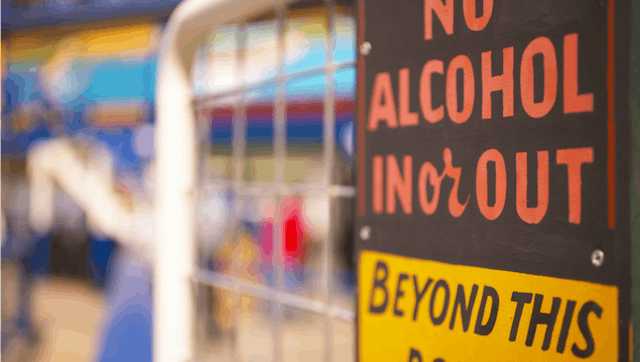Dry January Is Not The Same As Sobriety

For those of you who started, tried, or completed some version of Dry January, well done. Opting out of alcohol is never a bad idea. Examining your relationship with alcohol is never a bad idea either.
Dry January started in the United Kingdom in 2013 as a way to do both and has spread to the United States. Saying no to booze for a month has a sliding scale of difficulty. Some people have no problem giving it up. Others feel tested and struggle with willpower; they miss drinking. Others just can’t do it.
I am not judging anyone’s ability to give up alcohol for a day, a week, a month, or a lifetime. I have no room to judge–I am an alcoholic. I’m 18 months sober and hope to string sobriety together one day at a time for the rest of my life. But here’s a friendly reminder about Dry January: choosing to give up alcohol is not the same as needing to give up alcohol. A dry month is not the same as a dry life.
Taking a month off from drinking has significant health benefits. You will likely lose weight, start to sleep better, and improve your immune system. You will save money and get better at saying no when someone offers you a drink. Non-alcoholics struggle with this too because even when used in a responsible way, alcohol is a way to self-medicate. It takes the edge off, tastes good, and provides lots of feel-good chemicals that help us relax and be happy.
It’s also socially accepted and expected. Mommy wine culture is a real thing and can be a dangerous slide into (or an easy cover for) problem drinking. Masculinity is often woven together with the type of booze or number of drinks consumed while out with friends. Drinking is a very prominent part of our society, our daily lives, and our relationships.
To be honest, I am jealous of those of you who are capable of limiting yourself to just one or two drinks at a time. I would love to unwind some nights with a gin and tonic. But one turns into five in a hurry. Sometimes I am mad at myself I can’t have one of those wild nights with friends to blow off steam or celebrate a birthday or wedding. But the amount of alcohol you drink during one of those events is likely the amount I used to drink on a random Tuesday. It took a lot to for me to get “wild and crazy,” and it usually ended with me vomiting somewhere and having to apologize for my actions.
If you are choosing to go alcohol-free for a month, that’s great for you, but please don’t complain about how hard it is to not have your evening cocktail. Please take time to notice how awkward it feels to drink water or soda instead of wine at a friend’s dinner party. If you are not a problem drinker or alcoholic, you don’t have to give it up—well, you don’t really ever have to do anything. But to live a meaningful and healthy life, the alcoholic and alcohol abuser needs to stop drinking.
Whether it is in January or another month of the year or a few days or weeks at a time, if you choose to cut back or take a break from drinking, be thankful that it is a choice you can make. Be thankful it is an inconvenience and not a lifetime of fighting addiction. Absolutely enjoy the benefits of alcohol-free time, including the benefit of realizing just how dependent you may be on it. It will also help you reduce your risk of harmful drinking habits.
In a survey done by Dr. Richard de Visser from the University of Sussex, he found that six months after Dry January had ended, seven out of ten people who participated had continued to drink less dangerously than before. And nearly a quarter of the participants who had been drinking at “harmful” levels before Dry January were now in much lower risk categories for problem drinking.
Sometimes I am ashamed of my addiction, but I am proud of my sobriety. I don’t want pity either. I share my story because it helps me, and I know it helps others. Yes, sobriety is really fucking hard at times, but it is really beautiful too. I share both sides of addiction, and I am inching my way closer to my most authentic life with each drink I run, walk, or crawl away from. I applaud anyone who is willing to be honest with themselves; it’s not easy to take a break and check in to see what is working and what is not, especially when it comes to alcohol.
If you have the luxury of maintaining a job, money in the bank, and healthy relationships with family and friends while having a healthy relationship with booze, congratulations. Those of us who are alcoholics don’t have that ability. We are addicts. Our brains are wired differently, and we need to be honest about the lives we want to live.
I needed to stop drinking to live the life I want. If you choose to stop drinking for a month, more power to you, but please don’t complain to me and other addicts how hard it is to give up alcohol. I get it. Maybe you have a problem too, and this is a sign you need to address it. Or maybe you just need to suck it up and know that your cold one is waiting for you at the end of the month. Enjoy the benefits, but don’t act like 31 days without booze will kill you.
Because, for some of us, drinking really is a life or death decision.
This article was originally published on